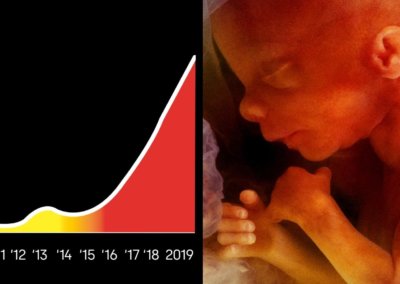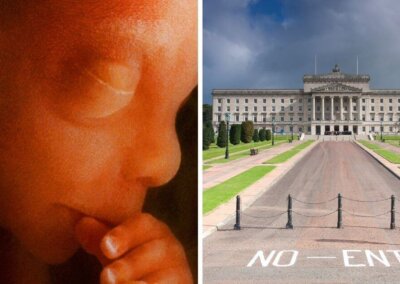Newly released data from the Office of National Statistics (ONS) show almost 1 in 4 of all pregnancies* ended in abortion.
There were 657,076 live births in England and Wales in 2018 according to the ONS, and 205,295 abortions over the same time period according to the Department of Health. Combining these two figures gives the total number of pregnancies* in England and Wales in 2018 of 862,371.
Therefore, 23.8% of all pregnancies* (almost one in four) in England and Wales ended in abortion. In 2012, however, 20.7% of all pregnancies ended in abortion*. The 2018 figure therefore represents an increase from approximately 1 in 5 pregnancies ending in abortion to almost 1 in 4 ending in abortion.
Compared with 1969 – the first year with complete figures for total number of abortions – where there were 54,819 abortions, there has been a 270% increase in the proportion of the total number of pregnancies ending in abortion in England and Wales.
In 2018, in Northern Ireland, there were 1,097 abortions (including abortions that occurred in Northern Ireland and women that travelled to England and Wales). This figure represents less than 1 in 20 pregnancies (excluding stillbirths and natural miscarriages) ending in abortion in Northern Ireland.
However, the British Parliament in Westminster has voted to force abortion on Northern Ireland unless Stormont is able to reconvene by the 21st October. The new extreme abortion regime would permit abortion up to 28 weeks gestation for any reason, and it is likely that within a few years, the proportion of pregnancies ending in abortion in Northern Ireland will be similar to England and Wales.
Catherine Robinson, spokesperson for Right to Life UK, said:
“It is a national tragedy that almost 1 in 4 pregnancies (excluding still births and natural miscarriage) in England and Wales ended in abortion in 2018. This represents one of the highest proportions of abortions to live births since abortion was introduced in 1967 – the only year with a higher proportion was 2001 where 23.9% of all pregnancies ended in abortion.”
“Every one of these abortions represents a failure of our society to protect the lives of babies in the womb and a failure to offer full support to women with unplanned pregnancies.”
“On the other hand, these figures show the dramatic difference that laws surrounding abortion make. In 2018, for women resident in Northern Ireland, less than 1 in 20 of all pregnancies* ended in abortion (including the women who travelled to England and Wales for abortions), whereas in England and Wales, almost 1 in 4 of all pregnancies ended in abortion*.”
“If the new abortion regime that Westminster is imposing on Northern Ireland comes into force on the 21st October, there will likely be a rapid increase in the number of pregnancies ending in abortion in Northern Ireland. This will likely be made worse by the fact the law being introduced is so extreme – permitting abortion up to 28 weeks with no legal safeguards.
“Questions must be asked about why an increasing proportion of pregnant women are ending their pregnancies via abortion.”
“Proposals from abortion campaigners to remove legal restrictions around abortion and introduce abortion up to birth would likely see these numbers get even worse. The only winners in this sad state of affairs are abortion providers who can capitalise on this situation, and perhaps, are even part of the cause of it, insofar as they want ever more abortions to increase their income.”
* excluding natural miscarriage and still birth
(Image credit AdobeStock: Cari)











